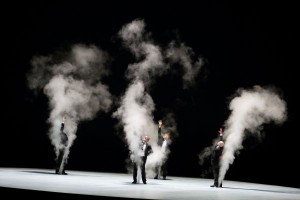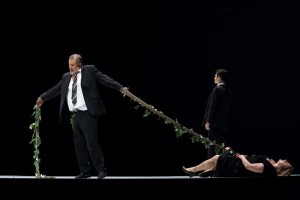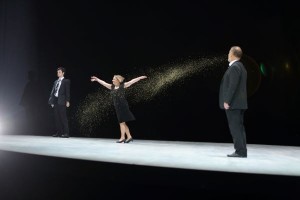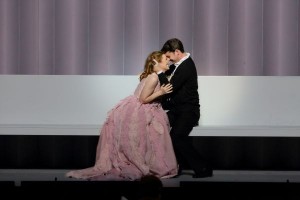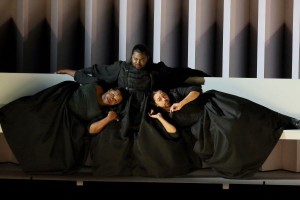KOSKY’S QUEEN AND CASTLE
On the surface, there isn’t much that unites Henry Purcell’s 1688 Dido and Aeneas and Béla Bartók’s 1918 Bluebeard’s Castle, except perhaps that men are not to be trusted. But when you see Barrie Kosky’s fiery fabrication of these two short operas, presented by LA Opera beginning Saturday, expect to be overwhelmed not just by astoundingly inventive direction but by the resonant themes of approval and denial, adoration and overwhelming defeat. Previously seen at the Frankfurt Opera and Edinburgh International Festival, the double bill had the opera world reeling over Kosky’s vision, and you only have six chances to catch it.
Those lucky enough to have witnessed Kosky’s inventive The Magic Flute last December at LA Opera will understand the buzz: The Australian director presented the visuals of Mozart’s opera replete with animation like the gag cartoons of the 1920s, configuring the often tedious spoken dialogue with projected titles of text that mimicked placards from live-action silent movies. The whimsical quirkiness actually pulled out the magic and beauty of the music. The result’”colorful, clever, and gorgeous’”made this technologically daring wonderment the best opera of the season.
Sung in Hungarian with English supertitles, Bartók’s Bluebeard’s Castle is an erotically charged and deliriously dark duet that warns of the dire consequences of female curiosity. In their sleek modern formalwear, Judith (German mezzo-soprano Claudia Mahnke) and Bluebeard (British bass-baritone Robert Hayward reprising his highly praised performance) offer an intriguing picture of a privileged, well-to-do couple who, unbeknownst to the outside world, are locked in an impassioned but destructive love affair. Designer Katrin Lea Tag (making her LA Opera debut) has created a stunningly restrained revolving set suggesting a blank, echoing fortress’”a place that is somehow both grand ballroom and a desolate prison chamber all at once.
Bluebeard’s dark and claustrophobic castle is daringly inverted by Kosky, who fills the otherwise empty stage with a vast white disc. The entire action of the opera consists of Judith, Bluebeard’s new bride, unlocking a series of doors in the castle, learning more about her new husband each time. In Kosky’s staging, there are neither doors nor keys’”the disc revolves seven times over the course of the opera, in concert with the opening of the seven doors. Visual effects and Joachim Klein’s lighting depict what is revealed within, magnified musically by the incredible richness of the orchestration. Conductor Steven Sloane, who heads the Bochumer Symphoniker and the Stavanger Symphony Orchestra, will conduct the large orchestra.
Sung in English with projected English texts over the stage, Dido and Aeneas is a Greek myth of grand proportions. Here the action plays out along the front edge of the stage and spills into the orchestra pit, providing an almost unprecedented intimacy between the performers and the audience. The entrancing Irish mezzo-soprano Paula Murrihy, with a voice as sinuous as warmed honey, plays the widowed Queen Dido, who has vowed never to marry again, but her charismatic courtiers long for merriment and above all, political security. Liam Bonner, sensational in LA Opera’s Billy Budd, is the handsome Trojan War hero Aeneas, who enters the scene utterly besotted with the heroine. Dido ricochets between desire and agonized restraint, as if she foresees the bad end this will all inevitably come to (hey, it is an opera). The unhappy conclusion is set into motion by three cross-dressing witches, gleefully led by a sorceress. Three exceptional African-American countertenors’”John Holiday (Sorceress), G. Thomas Allen (First Witch), and Darryl Taylor (Second Witch)’”make their LA Opera debuts, and I’m most certain that never before have three black countertenors been in one production together on an opera stage, let alone three who are in drag.
Prepare yourself for two entirely different theatrical worlds created by a director who is making opera so exciting that jaded opera lovers are born again, and those new to the art form are instantly hooked.
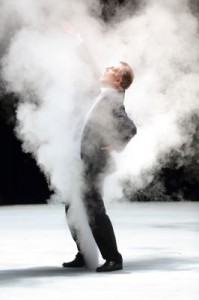 photos by Craig Mathew / LA Opera
photos by Craig Mathew / LA Opera
Dido and Aeneas & Bluebeard’s Castle
Los Angeles Opera
Dorothy Chandler Pavilion
scheduled to end on November 15, 2014
for tickets, call 213.972.8001
or visit www.LAOpera.org

